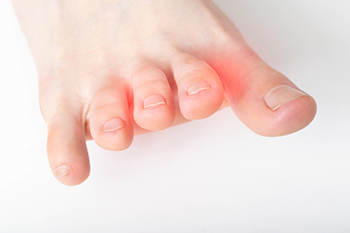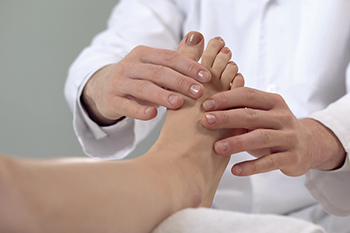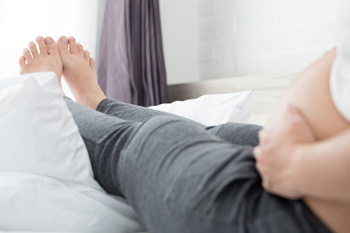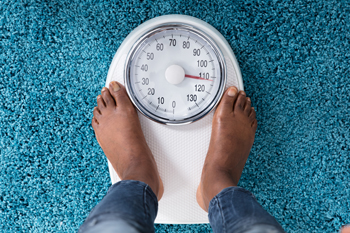Connect With Us
Blog
Items filtered by date: September 2022
Wearing High Heels May Cause Morton’s Neuroma

The pain that is associated with the foot condition that is known as Morton’s neuroma is generally found in the ball of the foot. It happens as a result of a compressed or irritated nerve between the third and fourth toes, and it occurs more frequently in women. Wearing high heels may be a common cause for Morton’s neuroma to develop. More often than not, the toes may have limited room to move freely in, and the nerve may become inflamed. Common symptoms of this ailment include a burning sensation in the ball of the foot, and some patients describe the feeling as similar to standing on a marble or pebble. Additionally, the toes may be affected as the pain radiates through the foot, and can be uncomfortable. A proper diagnosis is needed to rule out arthritis or a fracture, and this is accomplished by having an X-ray taken. If you have pain in this part of your foot, a podiatrist can provide you with answers to questions you may have, and guide you toward the treatment that is best for you.
Morton’s neuroma is a very uncomfortable condition to live with. If you think you have Morton’s neuroma, contact one of our podiatrists of Podiatry Care Specialists. Our doctors will attend to all of your foot care needs and answer any of your related questions.
Morton’s Neuroma
Morton's neuroma is a painful foot condition that commonly affects the areas between the second and third or third and fourth toe, although other areas of the foot are also susceptible. Morton’s neuroma is caused by an inflamed nerve in the foot that is being squeezed and aggravated by surrounding bones.
What Increases the Chances of Having Morton’s Neuroma?
- Ill-fitting high heels or shoes that add pressure to the toe or foot
- Jogging, running or any sport that involves constant impact to the foot
- Flat feet, bunions, and any other foot deformities
Morton’s neuroma is a very treatable condition. Orthotics and shoe inserts can often be used to alleviate the pain on the forefront of the feet. In more severe cases, corticosteroids can also be prescribed. In order to figure out the best treatment for your neuroma, it’s recommended to seek the care of a podiatrist who can diagnose your condition and provide different treatment options.
If you have any questions, please feel free to contact our offices located in West Chester, and Broomall, PA . We offer the newest diagnostic and treatment technologies for all your foot care needs.
Effective Methods That May Help to Prevent Falling

Research has indicated that approximately 25% of people who are over 65 years old will experience a fall. This can result in a serious foot injury, such as a broken foot or ankle. People who have fallen may develop a fear of falling, which may lead to becoming inactive. There are methods that can be implemented that may help to reduce falling. These include having regular physical and eye examinations, and this is useful in updating existing medication and eyeglasses. Additionally, it is beneficial to install grab bars in the shower and toilet area, and it is safer while bathing when a bath mat is used. Many people improve the lighting in the household, and find it helpful to remove worn rugs that may be considered a tripping hazard. The feet can be affected by falling, and it is suggested that you consult with a podiatrist who can help you if that should happen
Preventing falls among the elderly is very important. If you are older and have fallen or fear that you are prone to falling, consult with one of our podiatrists from Podiatry Care Specialists. Our doctors will assess your condition and provide you with quality advice and care.
Every 11 seconds, an elderly American is being treated in an emergency room for a fall related injury. Falls are the leading cause of head and hip injuries for those 65 and older. Due to decreases in strength, balance, senses, and lack of awareness, elderly persons are very susceptible to falling. Thankfully, there are a number of things older persons can do to prevent falls.
How to Prevent Falls
Some effective methods that older persons can do to prevent falls include:
- Enrolling in strength and balance exercise program to increase balance and strength
- Periodically having your sight and hearing checked
- Discuss any medications you have with a doctor to see if it increases the risk of falling
- Clearing the house of falling hazards and installing devices like grab bars and railings
- Utilizing a walker or cane
- Wearing shoes that provide good support and cushioning
- Talking to family members about falling and increasing awareness
Falling can be a traumatic and embarrassing experience for elderly persons; this can make them less willing to leave the house, and less willing to talk to someone about their fears of falling. Doing such things, however, will increase the likelihood of tripping or losing one’s balance. Knowing the causes of falling and how to prevent them is the best way to mitigate the risk of serious injury.
If you have any questions, please feel free to contact our offices located in West Chester, and Broomall, PA . We offer the newest diagnostic and treatment technologies for all your foot care needs.
Handling Itchy Feet During Pregnancy

When a woman carries a baby to term during a pregnancy, she undergoes a litany of different bodily changes. Many of these changes can impact the feet. For example, during a pregnancy, a woman can experience sensations of itchiness on her feet. This itchiness can prove to be quite an annoyance for a pregnant woman, particularly during the nighttime when the sensations may interrupt sleep. Itchy feelings are primarily caused by hormonal skin changes. There are a number of steps that a pregnant woman can take to mitigate the itchiness. For instance, a woman can wear socks that have a loose fit and are made of breathable materials. In particular, socks that are made of cotton or even wool can fit this description. To soothe itchy feet, a pregnant woman can apply a good moisturizer on the feet. Additionally, giving the feet an oatmeal bath could help soothe itchiness. Lastly, massaging the feet could minimize itching sensations. Be sure to contact your podiatrist about these techniques and others to ensure that you are doing what is best for your own feet. If you are pregnant, contact a podiatrist today who can help you to maintain proper foot care.
Pregnant women with swollen feet can be treated with a variety of different methods that are readily available. For more information about other cures for swollen feet during pregnancy, consult with one of our podiatrists from Podiatry Care Specialists. Our doctors will attend to all of your foot and ankle needs.
What Foot Problems Can Arise During Pregnancy?
One problem that can occur is overpronation, which occurs when the arch of the foot flattens and tends to roll inward. This can cause pain and discomfort in your heels while you’re walking or even just standing up, trying to support your baby.
Another problem is edema, or swelling in the extremities. This often affects the feet during pregnancy but tends to occur in the later stages.
How Can I Keep My Feet Healthy During Pregnancy?
- Wearing orthotics can provide extra support for the feet and help distribute weight evenly
- Minimize the amount of time spent walking barefoot
- Wear shoes with good arch support
- Wear shoes that allow for good circulation to the feet
- Elevate feet if you experience swelling
- Massage your feet
- Get regular, light exercise, such as walking, to promote blood circulation to the feet
If you have any questions please feel free to contact our offices located in West Chester, and Broomall, PA . We offer the newest diagnostic and treatment technologies for all your foot and ankle needs.
Are Bunions Affecting Your Everyday Life?
Does Being Overweight Cause Foot Pain?

There should be no shame in being overweight or obese, but when your feet hurt because of your weight it might be time to make some lifestyle changes and see a podiatrist. The heavier you are, the more pressure and pain your feet can feel. It is said that your feet can take up to three times your body weight in force. Excess weight may cause gout, plantar fasciitis, heel pain, or osteoarthritis, among other afflictions. Being overweight can also lead to health conditions that affect the feet, such as type-2 diabetes, which can cause neuropathy and eventually amputation. Foot pain can make it hard to exercise and may interfere with losing weight which can cause a vicious cycle. You can appreciate your body and live a healthy lifestyle. A healthy diet can lead to weight loss even without exercise. It is important to stick to diet changes for 20 days or more for it to become a habit. Other things you can do to improve the comfort of your feet include wearing padded socks, not going barefoot, keeping your feet clean and dry, checking your feet regularly for cuts or bruises, and wearing well-fitting supportive shoes. If you are overweight and suffering from foot pain, consider seeing a podiatrist for a proper diagnosis and help in this area.
The more you weigh, the harder your feet must work to support your body. If you’re an obese individual and are concerned about your feet, contact one of our podiatrists from Podiatry Care Specialists. Our doctors can provide the care you need to keep you pain-free and on your feet.
Obesity and Your Feet
People who are overweight are putting more pressure on their ankles, knees, and hips as well as their feet. This unfortunately can lead to variety of different issues.
Problems & Complications Stemming from Obesity
- When the body is overweight, it tries to compensate by changing the way that it moves. An obese person may lean forward and put extra weight on the wrong part of the foot. This puts unnecessary stress on the feet.
- Obese people are also more likely to develop type II diabetes which is a condition that causes a lot of foot problems. People with diabetes often don’t feel the cuts and sores that they may have on their feet, which can lead to more complicated and severe issues.
- Plantar fasciitis is another foot condition that can be caused by obesity. Plantar fasciitis is an inflammation of the tissue along the bottom of the foot, which causes pain and stiffness while walking and climbing stairs.
If you have any questions, please feel free to contact our offices located in West Chester, and Broomall, PA . We offer the newest diagnostic and treatment technologies for all your foot care needs.

